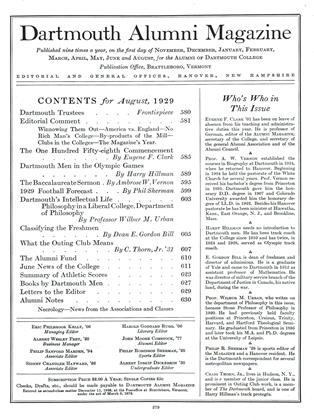Now that many colleges have come to be so much larger than they were prior to the opening of the last decade, the fraternity problem has almost everywhere become more acute. Those whose careers as undergraduates fell within the day of the much smaller Dartmouth, for example, will recall a time when the available fraternities sufficed to include in their membership all but a very small fraction of the student body, classically termed "oudens" in a day when Greek was a recognized element in the equipment of students of culture. No one foresaw the time when, despite the doubling or trebling of the number of Greek Letter societies, the available memberships therein would barely suffice to include half the undergraduate population.
With the altered circumstances has come the peril of artificial snobbery, although happily this has not proved a notable evil at Hanover; and with that danger has arisen the project for the provision of some comprehensive students' club—some figured flame to blend, transcend them all. This has come to full flower in some of the larger universities—the Harvard Union will recur instantly to the mind—and the idea is being carefully considered in many other places. The general plan is to provide some sort of universal clubhouse as a sort of social headquarters for everybody, and thus to do for college communities what is done for many large civic centers by City Clubs in which there is no note of artificial exclusiveness. At best such expedients seem to us capable of only a partial success so long as fraternities of very limited membership survive; but the theory is certainly well worth studying.
We have suffered less by far from fraternity exclusiveness at Hanover than has been suffered elsewherepartly, no doubt, due to the fact that in Hanover fraternity life does not include dining facilities. The clannishness and cliquiness seem to thrive most alarmingly when fraternity members not only room, but also eat, in fraternity buildings. There is perhaps ground for the expectation that the old fraternities will experience a distinct change—-indeed that is already truefrom the ancient concept of the weekly debating society, to the status of the purely social club. One hears occasional undergraduate talk of casting off national ties and making such fraternities into purely local organizations; and it is shrewdly suspected that what began as organizations professing a primary zeal for mental improvement have long ago drifted to the quite candid purpose of having a good time, with only the heritage of nomenclature and perhaps a ritual to recall the days of the founding fathers. That is especially the case with the colleges which have come to be three or four times their ancient size. Perhaps older alUtmni ought more frankly to recognize that the Greek Letter society of the present is a very different thing from the one they knew forty years or more ago—is, in short, a club more or less like the clubs one joins after one gets out in the world, rather than a gathering devoted to the furtherance of skill in debate, in forensic eloquence, or other purely intellectual pastime, with an occasional palliation in the way of music.
To form clubs is one of the characteristics of civilized man, and it is not a propensity one would be wise to combat. The primary question is whether, since fraternity membership, in a college community as large as 2000 undergraduates, must be confined to from 50 to 60 per cent of the total, relief can be had from the danger of overdone exclusiveness by the creation of a general social organization, open to every one who wishes, with dining facilities ("commons") and other familiar club incidents. It seems probable enough that such a device would serve admirably, within limits—indeed better than any other device. Certainly abolishing fraternities altogether would merely change the place and keep the pain, since other clubs would presumably take their places and leave the "ouden" problem unsolved.
At Dartmouth the College Commons served fairly well in this way; but as it is among the oldest of the newer buildings and has always left much to be desired, the prospect is that within a very short time it must be replaced by something better built and more nearly adequate to the ends to be served.
 View Full Issue
View Full Issue
More From This Issue
-
 Class Notes
Class NotesCLASS OF 1879
August 1929 By Henry Melville -
 Article
ArticleAlumni Council Meetings
August 1929 -
 Article
ArticleThe One Hundred Fifty-Eighth Commencement
August 1929 By Eugene F. Clark -
 Class Notes
Class NotesCLASS OF 1899
August 1929 By Warren C. Kendall -
 Class Notes
Class NotesCLASS OF 1903
August 1929 By John Crowell -
 Class Notes
Class NotesCLASS OF 1918
August 1929 By Frederick W. Cassebeer
Article
-
 Article
ArticleDARTMOUTH SUBSCRIBES $802 FOR NEAR EAST RELIEF FUND
May 1921 -
 Article
ArticleDartmouth Plates
June 1947 -
 Article
ArticleMasthead
FEBRUARY 1973 -
 Article
ArticleMegalingo
MAY 1978 By ANNE BAGAMERY '78 -
 Article
ArticleThe Fifty-Year Address
July 1952 By E. BRADLEE WATSON '02 -
 Article
ArticleSquire of Tatterhummock
May 1979 By JAMES L. FARLEY '42


